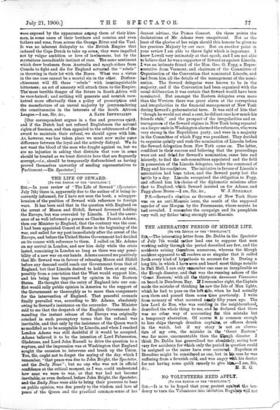THE LIFE OF SEWARD.
[To THE EDITOR OF THE "SPECTATOR.") Sra,—In your review of "The Life of Seward" (Spectator, July 7th) there is, apparently due to the author of it being in- correctly informed, for I have not seen the book, a misappre- hension of the position of Seward with reference to foreign wars. It has been said that in the question with England on the arrest of Mason and Slidell, Seward favoured holding the Envoys, but was overruled by Lincoln. I had the assur- ance of as well informed a person as Charles Francis Adams, then our Minister to England, that the contrary was the case. I had been appointed Consul at Rome in the beginning of the war, and sailed for my post immediately after the arrest of the Envoys, and before the United States Government had decided on its course with reference to them. I called on .Mr. Adams on my arrival in London, and saw him daily while the crisis lasted, remaining in London as long as there was any possi- bility of a new war on our hands. Adams assured me positively that Mr. Seward was in favour of releasing Mason and Slidell before any demand could reach our Government from that of England, but that Lincoln desired to hold them at any risk, possibly from a conviction that the West would support him, and his being less impressed by opinion in the Eastern States. He thought that the entry of England into our con- flict would rally public opinion in America to the support of the Government so thoroughly as to more than compensate for the intervention of England. That peaceful counsels finally prevailed was, according to Mr. Adams, absolutely owing to Seward's insistence on the surrender. The Minister said to me that the despatch of the English Government de- manding the instant release of the Envoys was originally couched in such peremptory terms that the refusal was inevitable, and that only by the insistence of the Queen was it so modified as to be acceptable by Lincoln, and when I reached "London Adams was still doubtful if it would be accepted. Adams believed it to be the intention of• Lord Palmerston, Gladstone, and Lord John Russell to drive the question to a rapture, and the impression was at Washington that England -sought the occasion _to. intervene and break up the Union. You Sir, ought not to -forget the saying of the day, which I remember, "that peace was due to John Bright, the Spectator, and the Daily Neese; but no one who was not in official confidence at the critical moment, as I was, could understand how near. we were to war, or that war had not become inevitable, or even declared, before John Bright, the Spectator, and the Daily News were able to bring their pressure to bear on public opinion, was due purely to the wisdom and love of peace of the Queen and the practical common-sense of her dearest adviser, the Prince Consort. On these points the declarations of Mr. Adams were unequivocal. Not as the least of the glories of her reign should this honour be given to her gracious Majesty by our race. But on another point in your review I am able to throw light which is important. I knew Lowell very intimately at that epoch, and I am not able to believe that he was a supporter of Seward as against Lincoln. X was an intimate friend of the Hon. Geo. G. Fogg, a Repre- sentative from Vermont, and chairman of the Committee of corganisation of the Convention that nominated Lincoln, and had from him all the details of the management of the nomi- nation. The Seward delegates were known to be in the majority, and if the Convention had been organised with the usual deliberation it was certain that Seward would have been nominated. But amongst the Eastern delegates even more than the Western there was great alarm at the corruptions and irregularities in the financial management of New York during Seward's gubernatorial term. It was said of him that "though he would not steal a cent, he did not care how much his friends stole," and the prospect of the irregularities and ex- travagances of the Seward regime in New York being repeated on a larger scale in Washington alarmed the reformers, who were very strong in the Republican party, and were in a majority in the Committee of which Fogg was president. They decided to organise quietly and rush the nomination of Lincoln before the Seward delegation from New Yak came on. The latter, confident in their success and believing that the proceedings were cut and dried for Seward's nomination, came late and leisurely, to find the sub-committees appointed and the field in possession of the Lincoln delegates, under the command of Fogg and his coadjutors. The initiative in favour of Lincoln's nomination had bean taken, and the Seward party lost the battle by a day. Lincoln recognised the obligation to Fogg, and offered him his choice of the diplomatic missions after that to England, which Seward insisted on for Adams, and Fogg chose Berne.—I am, Sir, &c., W. J. STILL/WT.
P.S.—Seward's election as Governor of New York State was on an anti-Manic issue, the result of the supposed murder of one Morgan by the Freemasons, whose secrets he had revealed. I remember the campaign and its pamphlets very well, my father being strongly anti-Masonic.


































 Previous page
Previous page